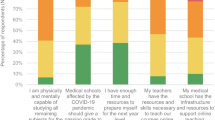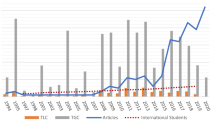Abstract
We conducted an exploratory study of the experiences of genetic counselors who have either trained or supervised in a second language to assess the relevance of this issue to genetic counseling training and supervision. Two hundred-thirty NSGC members, CAGC members and genetic counseling students completed the online questionnaire. Many of the respondents reported that training and supervision differed when another language was involved. Supervisors reported difficulty in assessing students’ counseling skills and discomfort with an incomplete understanding of session content. Students described a greater focus on vocabulary at the expense of psychosocial dimensions. Despite this, most felt that using another language enhanced their training experience. As such, training programs might consider increasing support to these learners and supervisors by explicitly acknowledging the challenges they face, providing students with language tools to aid in their acquisition of basic skills and providing supervisors with new methods for assessing student counseling skills when using other languages.
Similar content being viewed by others
References
Aguirre, C., Bermúdez, J. M., Cardona, J. R. P., Zamora, J. A., & Reyes, N. A. (2005). The process of integrating language, context and meaning: The voices of bilingual and bicultural therapists. In M. Rastogi & E. Wieling (Eds.), Voices of color: First-person accounts of ethnic minority therapists (pp. 189–209). Thousand Oaks: Sage Publications Inc.
Amaro, D. J., Abriam-Yago, K., & Yoder, M. (2006). Perceived barriers for ethnically diverse students in nursing programs. Journal of Nursing Education, 45(7), 247–254.
Anonson, J. M., Desjarlais, J., Nixon, J., Whiteman, L., & Bird, A. (2008). Strategies to support recruitment and retention of First Nations youth in baccalaureate nursing programs in Saskatchewan, Canada. Journal of Transcultural Nursing, 19(3), 274–283.
Arthur, N., & Collins, S. (2009). Culture-infused counselling supervision. In N. Pelling, J. Barletta, & P. Armstrong (Eds.), The practice of clincial supervision (pp. 267–295). Bowen Hills: Australian Academic Press.
Beacham, T., Askew, R. W., & William, P. R. (2009). Strategies to increase racial/ethnic student participation in the nursing profession. ABNF Journal, 20(3), 69–72.
Betancourt, J. R., & Cervantes, M. C. (2009). Cross-cultural medical education in the United States: key principles and experiences. Kaohsiung Journal of Medical Sciences, 25, 471–478.
Borders, L. D., Eubanks, S., & Callahan, N. (2006). Supervision of psychosocial skills in genetic counseling. Journal of Genetic Counseling, 15(4), 211–224.
Bowen, C. (2001). Service provision by representative institutions and identity. Halifax: Department of Canadian Heritage.
Castaño, M. T., Biever, J. L., González, C. G., & Anderson, K. B. (2007). Challenges of providing mental health services in Spanish. Professional Psychology: Research and Practice, 38, 667–673.
Choi, L. L. S. (2005). Literature review: issues surrounding education of English-as-a-Second-Language (ESL) nursing students. Journal of Transcultural Nursing, 16(3), 263–268.
Cross, D., Brennan, A. M., Cotter, V. T., & Watts, R. J. (2008). Cultural competence in the master’s curriculum: a course exemplar. Journal of Professional Nursing, 24, 150–154.
DeLapp, T., Hautman, M. A., & Anderson, M. S. (2008). Recruitment and retention of Alaska natives into nursing (RRANN). Journal of Nursing Education, 47(7), 293–297.
Down, G. (2000). Supervision in a multicultural context. In G. G. Barnes, G. Down, & D. McCann (Eds.), Systemic superiviosn: A portable guide to supervision training (pp. 61–77). Philadelphia: Jessica Kingsley Publishers Inc.
Drouin, J., & Jean, P. (2002). Educating future physicians for a minority population: a French-language stream at the University of Ottawa. Academic Medicine, 77, 217–221.
Drouin, J., & Rivet, C. (2003). Training medical students to communicate with a linguistic minority group. Academic Medicine, 78, 599–604.
Foreign Affairs and International Trade Canada. (2008). Language testing scales/levels. https://doi.org/www.international.gc.ca/ifait-iaeci/test_levels-niveaux.aspx?lang=eng.
Fuertes, J. N. (2004). Supervision in bilingual counseling: service delivery, training and research. Journal of Multicultural Counseling and Development, 32, 84–94.
Gamsie, M. (2009). The function of language for bilingual therapists: implications for the therapeutic relationship. Dissertation Abstracts International Section B: The Sciences and Engineering, 69(8-B), 5024.
Gardner, J. (2005). Barriers influencing the success of racial and ethnic minority students in nursing programs. Journal of Transcultural Nursing, 16(2), 155–162.
Hendrickson, S. M., McCarthy-Veach, P., & LeRoy, B. S. (2002). A qualitative investigation of student and supervisor perceptions of live supervision in genetic counselling. Journal of Genetic Counseling, 11(1), 25–49.
Hill, C. E., Thompson, B. J., & Williams, E. N. (1997). A guide to conducting consenual qualitative research. The Counseling Psychologist, 25(4), 517–572.
Hill, C. E., Knox, S., Thompson, B. J., Williams, E. N., Hess, S. A., & Ladany, N. (2005). Consenual qualitative research: an update. Journal of Counseling Psychology, 52(2), 196–205.
Hunter, J. L. (2008). Applying constructivism to nursing education in cultural competence: a course that bears repeating. Journal of Transcultural Nursing, 19(4), 354–362.
Johnson, M. B. (1997). Supervisor race, trainee gender, racial identity, and perception of supervision. Dissertation Abstracts International Section B: The Sciences and Engineering, 57(10-B), 6630.
Jungbluth, C., MacFarlane, I. M., McCarthy Veach, P., & LeRoy, B. S. (2011). Why is everyone so anxious?: an exploration of stress and anxiety in genetic counseling graduate students. Journal of Genetic Counseling, 20(3), 270–286.
Koskinen, L., Campbell, B., Aarts, C., Chassé, F., Hemingway, A., Juhansoo, T., et al. (2009). Enhancing cultural competence: trans-atlantic experiences of European and Canadian nursing students. International Journal of Nursing Practice, 15, 502–509.
Lee, R. L., Pang, S. M., Wong, T. K., & Chan, M. F. (2006). Evaluation of an innovative nursing exchange programme: health counselling skills and cultural awareness. Nurse Education Today, 27(8), 868–877.
Lega, M., McCarthy-Veach, P., Ward, E. E., & LeRoy, B. S. (2005). Who are the next generation of genetic counselors? A survey of students. Journal of Genetic Counseling, 14(5), 395–407.
Lindh, H. L., McCarthy-Veach, P., Cikanek, K., & LeRoy, B. S. (2003). A survey of clinical supervision in genetic counselling. Journal of Genetic Counseling, 12(1), 23–41.
McCarthy, P., & LeRoy, B. S. (1998). Student Supervision. In D. Baker, J. Schuette, & W. Ulhmann (Eds.), A guide to genetic counseling (pp. 295–233). New York: Wiley-Liss.
McIntosh, N., Dircks, A., Fitzpatrick, J., & Shuman, C. (2006). Games in genetic counselling supervision. Journal of Genetic Counseling, 15(4), 225–243.
Miller, E., & Green, A. R. (2007). Student reflections on learning cross-cultural skills through a ‘cultural competence’ OSCE. Medical Teacher, 29(4), e76–84.
Mittman, L., & Downs, K. (2008). Diversity in genetic counseling: past, present and future. Journal of Genetic Counseling, 17(4), 301–313.
Mittman, I., Smith, S., & Dougherty, C. (1995). Encouraging diversity among genetic counselors. Perspectives in Genetic Counseling, 17(3), S1–S7.
Norton, R. A., & Coleman, H. L. K. (2003). Multicultural superviison: The influence of race-related issues in supervision and outcome. In D. B. Pope-Davis, H. L. K. Coleman, W. M. Liu, & R. L. Toporek (Eds.), Handbook of multicultural competencies: In counseling & psychology (pp. 114–134). Thousand Oaks: Sage Publications Inc.
Oh, T., & Lewis, L. J. (2005). Consideration of genetic counseling as a career: implications for diversifying the genetic counseling field. Journal of Genetic Counseling, 14(1), 71–81.
Paul, B. D. (2001). Qualitative inquiry of biased and exemplary practices of White supervisors in multicultural supervision. Dissertation Abstracts International Section B: The Sciences and Engineering, 62(6-B), 2982.
Punales-Morejon, D., & Rapp, R. (1993). Ethnocultural diversity and genetic counseling training: the challenge for a twenty-first century. Journal of Genetic Counseling, 2(3), 155–158.
Sanner, S., & Wilson, A. (2008). The experiences of students with English as a second language in a baccalaureate nursing program. Nurse Education Today, 28(7), 807–813.
Schoonveld, K. C., McCarthy-Veach, P., & LeRoy, B. S. (2007). What is it like to be in the minority? Ethnic and gender diversity in the genetic counseling profession. Journal of Genetic Counseling, 16(1), 53–69.
Smith, S. C., Steinberg-Warren, N., & Misra, L. (1993). Minority recruitment into the genetic counseling profession. Journal of Genetic Counseling, 2, 171–182.
Smith, M., Freivogel, M., & Parrott, S. (2009). National Society of Genetic Counselors, Inc: Professional Status Survey 2008: NSGC.
Strauss, A., & Corbin, J. (1990). Basics of qualitative research: Grounded theory procedures and techniques. Newbury Park: Sage.
Teasdale, A. C. (2007). Multicultural events in supervision and counseling and traineed multicultural competence. Dissertation Abstracts International Section A: Humanities and Social Sciences, 68(A-4), 1341.
Verdinelli, S., & Biever, J. L. (2009). Experiences of Spanish/English bilingual supervisees. Psychotherapy Theory, Research, Practice, Training, 46(2), 158–170.
Wear, D. (2003). Insurgent multiculturalism: rethinking how and why we teach culture in medical education. Academic Medicine, 78, 549–554.
Weil, J., & Mittman, I. (1993). A teaching framework for cross-cultural genetic counseling. Journal of Genetic Counseling, 2(3), 159–169.
Acknowledgments
This project would not have been possible without the aid of the many genetic counselors and students who completed the online questionnaire and those who participated in focus groups; our sincere thanks are extended to them. We would also like to acknowledge the Department of Human Genetics at McGill University for their funding and support of this project and Dr. Xun Zhang for his aid with the statistical analysis.
Finally, the first, third and fourth authors would like to acknowledge the loss of the second author, Sui Mei “Linda” Chiu, who died in November 2011. Sui Mei is remembered fondly as a wonderful genetic counselor, teacher and supervisor who supported numerous bilingual genetic counseling students over her many years of service. She will be greatly missed.
Author information
Authors and Affiliations
Corresponding author
Rights and permissions
About this article
Cite this article
Vanneste, R., Chiu, S.M., Russell, L. et al. Effects of Second Language Usage on Genetic Counseling Training and Supervision. J Genet Counsel 22, 58–75 (2013). https://doi.org/10.1007/s10897-012-9509-7
Received:
Accepted:
Published:
Issue Date:
DOI: https://doi.org/10.1007/s10897-012-9509-7




